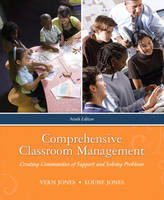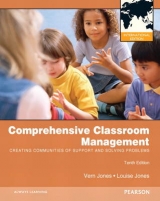
Comprehensive Classroom Management
Pearson (Verlag)
978-0-205-62548-2 (ISBN)
- Titel erscheint in neuer Auflage
- Artikel merken
Vern Jones is the curernt Chair of the Education Department at Lewis & Clark College Graduate School of Education and Counseling. He has experience as a junior high school teacher of students with emotional and behavior problems, a junior high school vice principal, and a district resource coordinator for students with emotional and behavior disorders. From 1986 to 1989, Vern was co-chair of the American Educational Research Association's special interest group on classroom management. He has served as a scholar in residence in the department of education at Western Michigan State University, visited California State University at Riverside as a Distinguished Scholar, given the centennial address for the University of Idaho School of Education, and served as a distinguished lecture series presenter at Hastings College in Nebraska. In 1990, he won the Burlington Northern Award as Graduate School Teacher of the Year at Lewis & Clark College. He has given keynote addresses at state conferences in over ten states and consulted with school districts and staff in over 25 states.
Preface.
I. FOUNDATIONS OF COMPREHENSIVE CLASSROOM MANAGEMENT.
1. Classroom Management in Perspective.
Extent of the Problem.
Social Factors Influencing Students' Behavior.
School Factors Significantly Influence Students' Learning and Behavior.
Classroom Management: A Changing Perspective.
Comprehensive Classroom Management.
The Author’s Basic Assumptions about Classroom Management.
Factors Influencing How Teachers Manage Their Classrooms.
Developing Your Own Approach to Effective and Professionally Responsible Classroom Management 37
2. Understanding Students' Basic Psychological Needs.
Theoretical Perspectives.
Students at Risk for School Failure.
The Issues of Order, Caring and Power.
II. CREATING A SAFE AND SUPPORTIVE LEARNING COMMUNITY.
3. Establishing Positive Teacher-Student Relationships.
Research on Teacher-Student Relationships.
The Teacher as a Model.
Establishing Effective Relationships with Students.
Methods for Communicating Caring and Support.
Evaluating the Quality of Teacher-Student Relationships.
4. Creating Positive Peer Relationships.
Why it is Important to Develop a Positive Classroom Community
Understanding the Classroom Group.
Acquaintance Activities.
Activities for Establishing a Cohesive, Supportive Group.
Activities for Enhancing Diverse Liking Patterns.
School Climate.
5. Working with Parents.
Keeping Parents Informed.
Parent Conferences.
Dealing Effectively with Parents' Criticism and Confrontation.
Placing School-Home Interaction in Perspective.
Additional Methods for Positively Engaging Parents of Second Language Learners.
Assessing Parent Contacts.
Implementing and Assessing New Methods.
6. Developing Standards for Classroom Behavior.
Developing General Behavior Standards or Rules.
Classroom Procedures.
Creative Examples of Teaching Rules and Procedures.
An Outline for Beginning the School Year.
Classroom Management Skills That Help Maximize On-Task Behavior.
Activities for Implementing and Assessing New Methods.
III. INCREASING STUDENT MOTIVATION AND LEARNING BY IMPLEMENTING INSTRUCTIONAL METHODS THAT MEET STUDENTS' ACADEMIC NEEDS.
7. Enhancing Students' Motivation to Learn.
Key Issues in Student Motivation to Learn.
Students' Academic Needs.
Meeting the Needs of Students with Special Needs.
Two Additional Methods for Enhancing Students’ Motivation to Learn: Cooperative Learning and Peer Tutoring.
Example of Enhancing Motivation and Student Success.
Implementation Activities.
IV. WHEN PREVENTION IS NOT ENOUGH: METHODS FOR ALTERING UNPRODUCTIVE STUDENT BEHAVIOR.
8. Responding to Violations of Rules and Procedures.
Effective Responses to Irresponsible Student Behavior
Responding to Defiant Behavior.
A Classroom Procedure for Responding to Disruptive Behavior.
Activity for Assessing Your Skills in Responding to Escalating Student Behavior.
9. Using Problem Solving to Resolve Behavior Problems.
Placing Problem Solving in Context.
A Model for Solving Problems with Individual Students.
Methods for Solving Problems between Students.
Methods for Group Problem Solving.
Methods of Responding to Serious and Continuing Student Behavior Problems
Incorporating Problem Solving into a Schoolwide Student Management Plan.
Implementation Activities.
10. Developing Individual Behavior Change Plans.
Behavior Management in Perspective.
Understanding What Causes Student Behavior: Conducting an Environmental Analysis/Functional Assessment.
Strategies for Helping Students Develop New Behavioral Skills.
A Team Approach to Developing a Positive Behavior Change Plan.
Implementation Activities.
Appendix A: Possible Procedures for Common Areas in an Elementary School.
Appendix B: Recommendations for Secondary-Level Teachers Regarding the Teaching of Limited English-Proficiency Students.
| Erscheint lt. Verlag | 13.2.2009 |
|---|---|
| Sprache | englisch |
| Maße | 191 x 235 mm |
| Gewicht | 667 g |
| Themenwelt | Sozialwissenschaften ► Pädagogik |
| ISBN-10 | 0-205-62548-7 / 0205625487 |
| ISBN-13 | 978-0-205-62548-2 / 9780205625482 |
| Zustand | Neuware |
| Haben Sie eine Frage zum Produkt? |
aus dem Bereich



